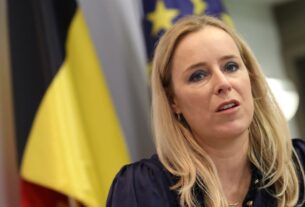PRAGUE — There was an unusual sight for EU leaders as they arrived at the ornate Prague Castle on Friday: Protesters waving EU flags positively.
“No veto, strong EU,” they chanted as each leader pulled up.
The compact but vocal gathering was cordoned off behind a ring of fencing clearing the way for the BMWs chauffeuring EU leaders to their Friday summit, where they were set to discuss the mounting energy crisis and its cause — Russia’s ruinous war in Ukraine.
Enemy No. 1 for the crowd: Hungary’s Viktor Orbán, the obstreperous leader known for stalling Russia sanctions and spouting EU vitriol back home.
Boos rained down on Orbán as he rolled up.
“Why are they booing you?” a journalist shouted.
“They like me,” Orbán quipped.
The gathering was orchestrated by Volt, the pan-European political party that promotes increased European cooperation. Purple Volt flags intermingled with EU and Ukrainian flags, while attendees rows deep donned purple Volt shirts. Damian Boeselager, a Volt co-founder and European Parliament member, told POLITICO the protesters were mostly elected officials from across Europe, in town for the party’s annual general assembly.
Prague has gained more attention in recent weeks for the throngs of protesters who have flooded the streets to rally against the EU. They blamed the EU’s sanctions for the economic woes gripping the country — a common Kremlin propaganda line — and called on the Czech government to resign. Pro-Putin T-shirts dotted the crowd.
This time the ralliers were encouraging the EU leaders to stand firm against Moscow, not to accommodate it. The scale, of course, was quite different — a tight cluster compared to tens of thousands.
#NOVETO was spelled out across seven signs held aloft — a reference to the EU unanimity requirements to approve sanctions and make foreign policy decisions. Another sign read “Western tanks for Ukraine,” alluding to EU allies’ preference to pass along Soviet-era tanks because Kyiv’s military is already trained in using them.
Seeing a like-minded group, another EU leader, Lithuanian President Gitanas Nausėda, turned away from the castle after exiting his car and strode over to the chanters.
“I see those words,” he said, referencing signs encouraging the EU to funnel more weapons to Ukraine — an increasingly sore point for juggernauts like Germany and France, which have faced criticism that they can afford to up their contributions.
“This is our main task,” Nausėda said. “And I think we have certain unity around the table.”
Lithuania, its Baltic neighbors and nearby Poland have been among the EU’s most hawkish countries since the war began, regularly pushing their colleagues to go further on sanctions and to reach deeper into their armories.
But while the EU recently agreed to adopt an eighth package of sanctions targeting Russia’s steel industry and the technology used to power Moscow’s military, new European weapons pledges for Ukraine have waned in recent months.
Still, Nausėda vowed: “You will be left not alone. Lithuania, Baltic countries, Poland and everybody will support you. Please be sure that we will win. And the victory will be yours and your victory will be our victory.”
And with that, Nausėda pumped his fist to cheers, offered a “so all the best,” and departed, a few “thank yous” trailing behind him.



